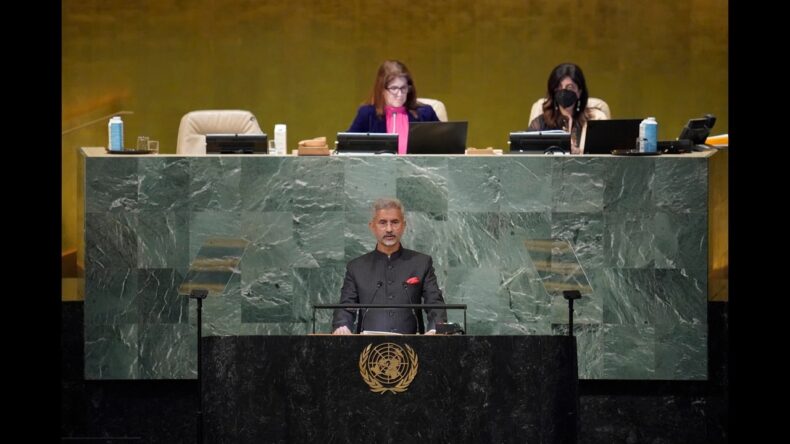S. Jaishankar, the minister of external affairs, India stated that it is in everyone’s best interest to cooperate constructively in order to find a swift resolution to the situation in Ukraine.
India’s peace with Ukraine

India is on the side of peace in the Ukraine conflict and will stay there, according to external affairs minister S. Jaishankar in a speech to the United Nations General Assembly. India is also on the side that respects the United Nations charter and its founding principles, calls for diplomacy and dialogue, and is on the side of those who are struggling to make ends meet despite the rising costs of food, fuel, and fertilisers.
Therefore, Jaishankar told the Assembly, “it is in our common interest to engage constructively both inside and outside the United Nations to find an early resolution to this crisis.”
The current international system was also criticised by India as being “anachronistic and ineffectual.” It is also seen as being quite unfair, according to Jaishankar, to exclude entire continents and regions from a discussion on their destiny. While stating that India was prepared to assume more responsibility, he also called attention to the concerns of the developing world. India was expected to concentrate on challenges of the global South at the UN, according to HT on Wednesday.
Jaishankar presented India as a democratic and responsible power that was there for its neighbours and the global South in times of need while serving as the voice of reason in the international system during his speech, which was centred on the current transformation in international politics, the series of shocks that had led to a reset in assumptions and policies.
As India celebrates 75 years of independence, the minister took use of the UNGA platform to discuss the post-Independence path of Indians. The story of that time was one of the labour, tenacity, inventiveness, and enterprise of millions of common Indians. They are rebuilding a society that has been pillaged by centuries of colonialism and foreign invasions. He asserted that they were carrying out their activities within a “democratic framework,” whose gradual advancement is reflected in more “genuine voices and grounded leadership.”

Jaishankar described the “new India” under Narendra Modi as “a confident and resurgent society” and listed the five pledges the PM made on Independence Day: to make India a developed nation by 2047; liberation from a colonial mindset; treating India’s rich cultural heritage as a source of pride and strength “This expresses a coming together on global issues, such as terrorism, pandemics, or the environment”; fostering greater unity and solidarity (“This applies to nations, as much as it does to citizens”); and instilling awareness of duties and responsibilities.
According to the minister, it was this conviction that inspired India to provide vaccines to more than 100 countries, make room for other citizens in need during relief operations for natural disasters, and offer partnerships to nations in Asia, Africa, and Latin America “based on their needs and priorities.” “Today, the emphasis is on sustainable development, improved connection, digital delivery, and affordable healthcare. You may witness 700 initiatives around the world that demonstrate our solidarity, which goes beyond words.”
The change in the global landscape
However, despite underlining India’s unique political achievements and contributions, the minister claimed that the “international scene” had deteriorated.
Post-pandemic economic recovery presents issues that the entire world is already battling. The developing world’s debt situation is fragile. The growing prices and decreasing supply of fuel, food, and fertilisers have now been added to this. These are a few of the various effects of the Ukraine conflict, coupled with economic disruptions and diversions.
The minister made reference to China’s aggressive actions when he remarked that there are new worries about the stability and security of the Indo-Pacific region. And he pointed out how climate events have added an additional layer to these growing concerns.
Jaishankar discussed the effects on the global south at this point. “The South will be more affected, as we observed in the case of the Covid epidemic, even though the immediate causes are far-reaching. It is crucial that this injustice be acknowledged in international discussions. The unequal distribution of vaccines shouldn’t be repeated in other fields.”
Global South and multilateralism
Returning to the subject of south-south cooperation, Jaishankar said that it was sensitive to the “challenges faced by developing countries” as India prepared to assume the G20 chair. This cooperation is based on the principles of respect for one another and national ownership.
India would collaborate with the other G-20 members to tackle important issues including debt, economic expansion, food and energy security, and environment in particular. One of our top priorities will always be the reform of multilateral financial organisations’ governance.
Jaishankar said of India’s time at the UN Security Council, which ends this December, that it had “served as a bridge on some significant but difficult issues before the Council.”
“We have also given attention to issues like marine security, maintaining peace, and countering terrorism. Our efforts include anything from giving technology a human touch to making sure UN Peacekeepers are safe and secure.”
UNSC changes
Jaishankar asserted that multipolarity, rebalancing, fair globalisation, and reformed multilateralism could not be put on hold and that India had always advocated for a “cooperative, inclusive, and consultative approach to international relations.”
The appeal for reformed multilateralism, with Security Council reforms at its centre, has a lot of support among UN members. Furthermore, it does so because of “widespread acknowledgment that the current architecture is archaic and ineffective,” he continued. It is also viewed as being extremely unfair because it excludes entire continents and regions from participating in discussions about their future.
He claimed that while India was willing to assume more responsibility, it also wanted to “decisively redress” the injustice experienced by the global South.












